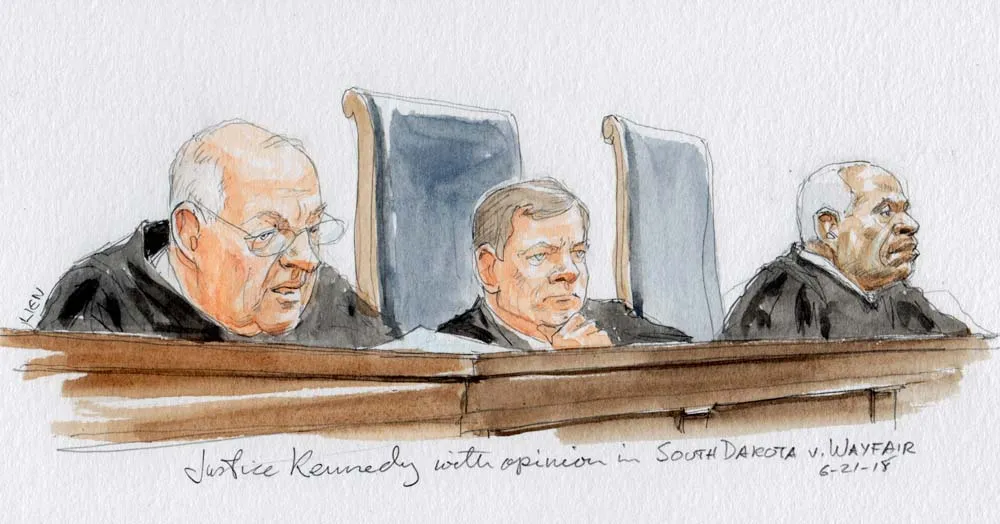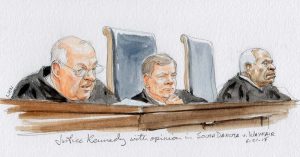Justice Kennedy: A justice who changed his mind

on Jun 29, 2018 at 12:05 pm

Daniel Hemel is an assistant professor of law at the University of Chicago Law School.
Justice Anthony Kennedy’s majority opinion in the online-sales-tax case South Dakota v. Wayfair was his final — and most significant — decision involving the dormant commerce clause doctrine, which prohibits state and local governments from passing laws that discriminate against or unduly burden interstate commerce unless Congress consents. Wayfair also was a sharp break from Kennedy’s dormant commerce clause jurisprudence over the preceding three decades. Before Wayfair, Kennedy was one of the most ardent defenders of the much-maligned dormant commerce clause and one of the most reliable votes in favor of litigants who challenged state and local laws on the ground that they violated that doctrine. Wayfair, in which the majority overturned decades-old precedents that had prohibited states from collecting sales taxes on their residents’ transactions with out-of-state online and mail-order retailers, was a rare dormant commerce clause case in which Kennedy cast a decisive vote on the states’ side.
Although Wayfair was in many ways uncharacteristic of Kennedy’s dormant commerce clause jurisprudence, his jurisprudence in this area was emblematic of his larger body of opinions and votes. First, Kennedy was a faint-hearted federalist. While his rhetoric regarding federalism was lofty, his votes in concrete cases often did not match up. His most influential dormant commerce clause opinions prior to Wayfair included C & A Carbone Inc. v. Town of Clarkstown, in which he wrote for a five-justice majority to strike down a municipal ordinance that required solid waste generated within the town’s boundaries to be deposited at a designated processing facility, and Granholm v. Heald, in which he wrote for a 5-4 majority invalidating state laws that limited the ability of out-of-state wineries to sell directly to consumers. He also cast a crucial fifth vote to strike down a Maryland personal-income-tax law on the basis of the dormant commerce clause in Comptroller v. Wynne, and dissented from several majority opinions upholding state laws challenged on dormant commerce clause grounds.
These dormant commerce clause decisions are of a piece with Kennedy’s votes on much higher-profile issues. In abortion-related cases, the presence or absence of a state or local government on either side of the “v.” rarely made a difference to Kennedy’s decisions. He cast an outcome-determinative vote in Planned Parenthood v. Casey to strike down a Pennsylvania provision that generally required women seeking abortions to notify their husbands; he joined a 5-3 majority in Whole Woman’s Health v. Hellerstedt to invalidate parts of a Texas law that imposed stringent requirements on physicians who performed abortions and on clinics where those procedures took place; and most recently, in National Institute of Family and Life Advocates v. Becerra, he voted to strike down a California law that required licensed “crisis pregnancy centers” to notify women about the availability of abortions. So too in cases implicating LGBT rights, Kennedy often found himself writing majority opinions that held that state laws and procedures were constitutionally infirm — including in Romer v. Evans, Lawrence v. Texas, Obergefell v. Hodges and Masterpiece Cakeshop v. Colorado Civil Rights Commission. If there was a theme running throughout these decisions, federalism was not it.
Second, Kennedy’s dormant commerce clause jurisprudence also illustrated that he — though sometimes described as a centrist — certainly was not a judicial minimalist. Rarely was he content to stay his hand and allow another branch to move first. As he wrote in his dissent in Department of Revenue of Kentucky v. Davis, courts must intervene to strike down state laws that unduly burden interstate commerce because otherwise, we might end up waiting “for decades until Congress can act.” Indeed, Wayfair — though unusual among Kennedy’s dormant commerce clause decisions in that there he voted to pare back the doctrine rather than to extend its reach — was nonetheless consistent with Kennedy’s general impatience with legislative self-correction. His majority opinion waved off Chief Justice John Roberts’ suggestion in dissent that the court should “leave these matters to Congress.” The court, according to Kennedy, should clean up doctrinal messes in the dormant commerce clause area “whether or not Congress can or will act in response.”
Third, Kennedy’s views of the dormant commerce clause showed how starkly his own jurisprudential approach diverged from the originalism and textualism that are now in vogue on the right. Kennedy was a dormant commerce clause true believer: He never questioned the validity of the doctrine, despite the fact that it is never clearly stated in the Constitution’s text. By contrast, Justice Antonin Scalia called the dormant commerce clause “a judicial fraud”; Justice Clarence Thomas said that the doctrine should be discarded; Justice Neil Gorsuch has suggested that he might agree with Thomas; and Justice Samuel Alito has indicated that he too may have dormant commerce clause doubts. For Scalia and Thomas — and perhaps also for Alito and Gorsuch — a commitment to originalism and textualism can override nearly two centuries of case law recognizing the dormant commerce clause doctrine. For Kennedy, who was never as enthralled by originalism or textualism as some of his conservative colleagues, that notion was a nonstarter.
Finally, Kennedy was, by almost any measure, a profoundly pro-business justice. His dormant commerce clause decisions demonstrated this tendency: Whether it was a solid waste processing company challenging a municipal ordinance (C & A Carbone) or a California winery challenging state limits on alcohol distribution (Granholm v. Heald), Kennedy was generally friendly toward business litigants challenging state taxes and regulations on dormant commerce clause grounds. And Kennedy’s pro-business tendencies were not limited to the dormant commerce clause context: He was a reliable vote in favor of arbitration of employment and consumer claims, limits on class actions and — with an occasional exception — federal pre-emption of state-law liability for business enterprises. According to one study, Kennedy was the sixth most consistent vote in favor of business litigants among 35 justices from 1946 to 2011, ahead of Scalia and Chief Justice William Rehnquist, with whom he overlapped for most of his career.
And then there is Wayfair. Not only did Kennedy write the majority opinion freeing states to extend their sales taxes to transactions between their residents and out-of-state retailers, but he also seeded the litigation with his concurring opinion in Direct Marketing Association v. Brohl, in which he made the unprompted suggestion that the “legal system should find an appropriate case for this Court to reexamine” two decades-old decisions that had limited states’ power to tax remote sales. Even more remarkably, one of those decades-old decisions — Quill v. North Dakota — was a case in which he had agreed with the majority’s result back when he was the second most junior justice on the court in 1992.
But Wayfair was not an outlier in all respects. For one, it would oversimplify matters to say that Kennedy’s vote went against business interests, notwithstanding the fact that the e-commerce companies Wayfair, Overstock.com and Newegg were aligned on the losing side against South Dakota. Brick-and-mortar stores like Lowe’s, Home Depot, Target and Walmart wholeheartedly supported South Dakota’s efforts to tax online sales. Wayfair was a business-versus-business case as well as a state-versus-business dispute.
Second, Wayfair was, as framed by Kennedy, as much a case about the “Cyber Age” as it was a case about the 19th-century dormant commerce clause. And when it came to new technology, Kennedy was something of a wild card. “The forces and directions of the Internet are so new, so protean, and so far reaching that courts must be conscious that what they say today might be obsolete tomorrow,” Kennedy wrote in Packingham v. North Carolina last term. Those words might be disconcerting to someone who valued doctrinal stability, but doctrinal stability was never Kennedy’s lodestar.
Last but not least, Wayfair exhibited what even critics can concede was — at least at times — one of Kennedy’s greatest virtues: the ability to change his mind. On abortion, Obamacare and ultimately online sales taxes, Kennedy was willing to acknowledge his own fallibility. His flip-flops could be maddening, but a justice who occasionally flip-flops is almost certainly preferable to a justice who sticks to his guns just so that he doesn’t have to admit that he was once wrong. Wayfair — as Kennedy’s final majority opinion, and the final time in which he reversed course — was a fitting swan song.
[Disclosure: Goldstein & Russell, P.C., whose attorneys contribute to this blog in various capacities, is among the counsel to the petitioner in Wayfair. The author of this post is not affiliated with the firm.]



